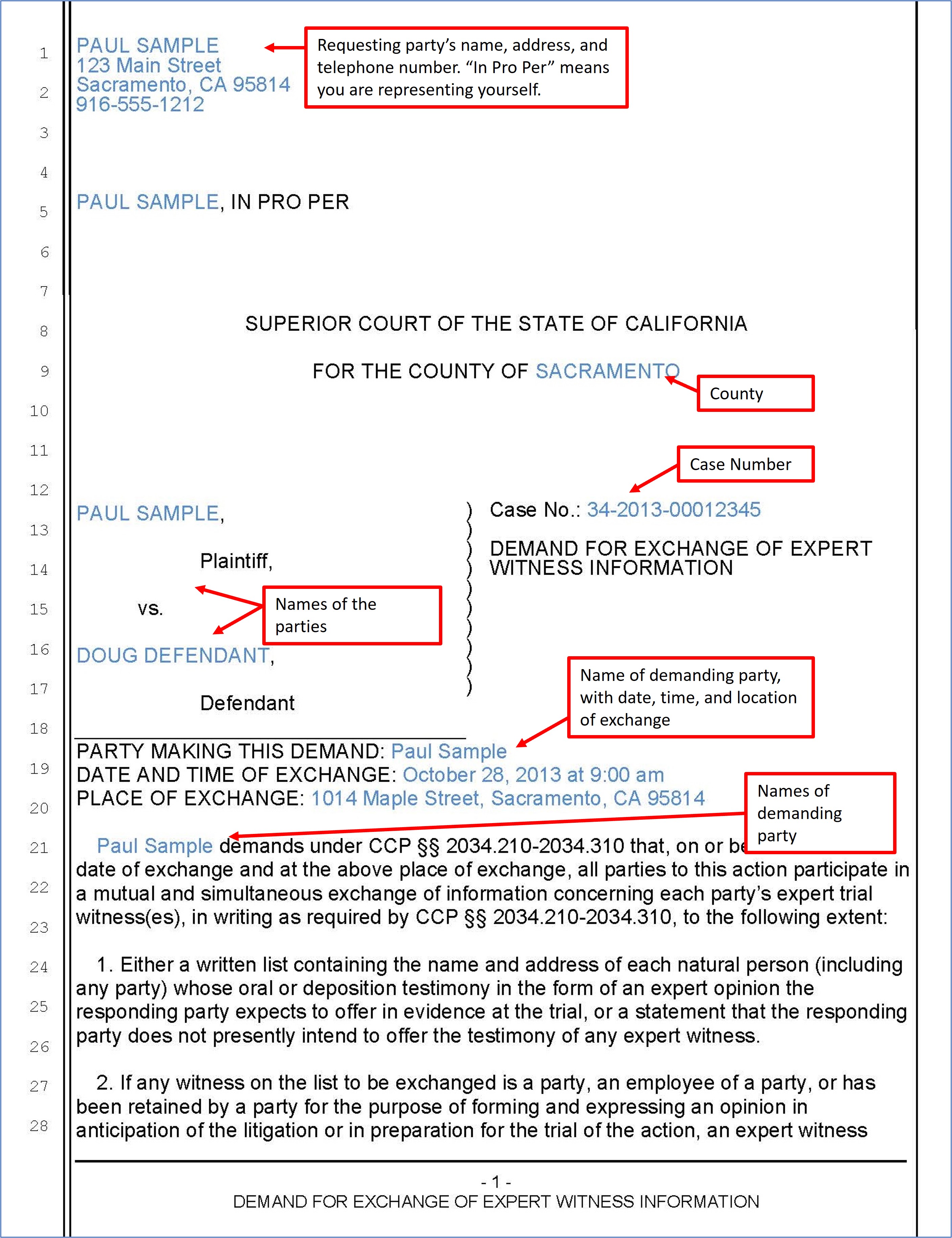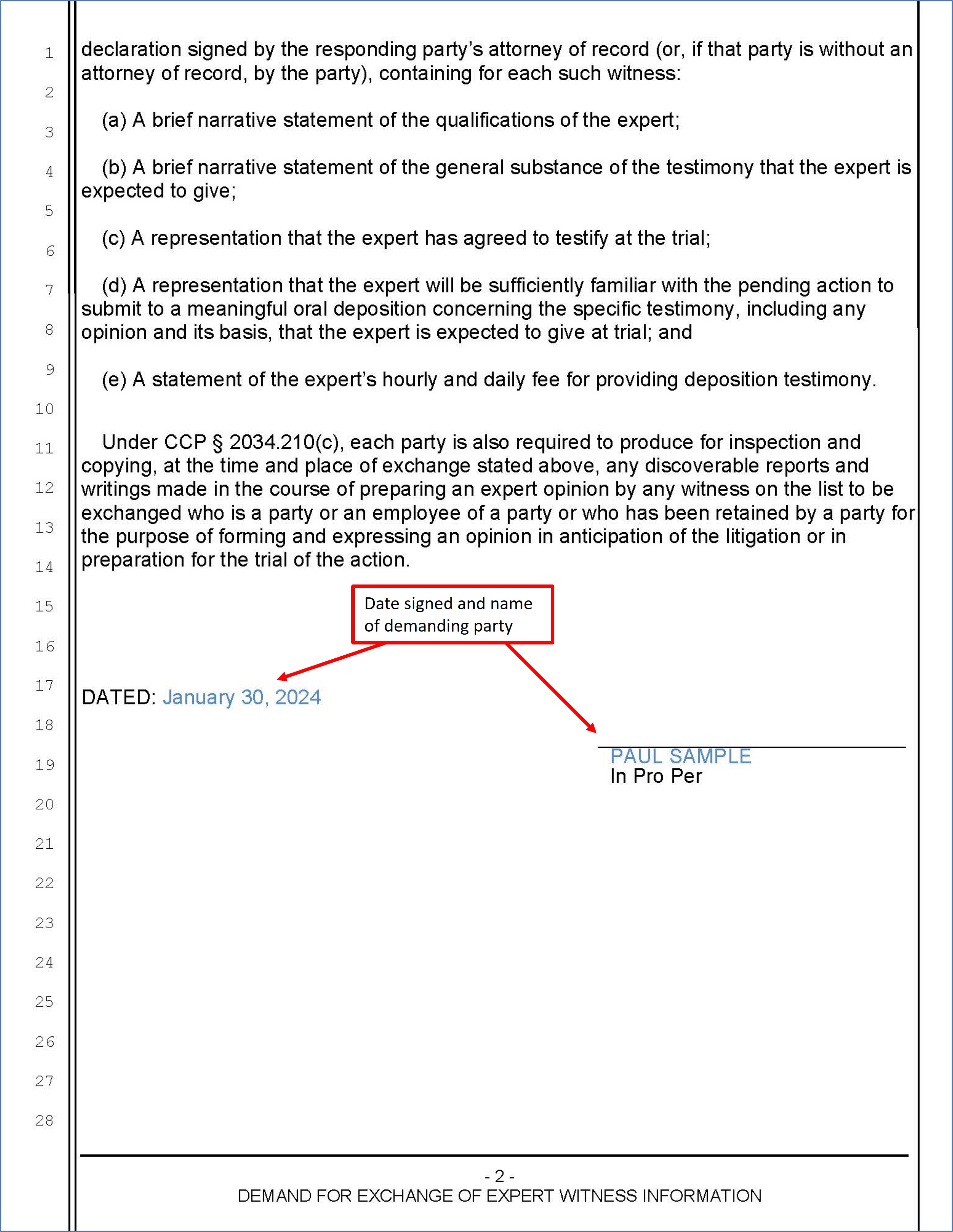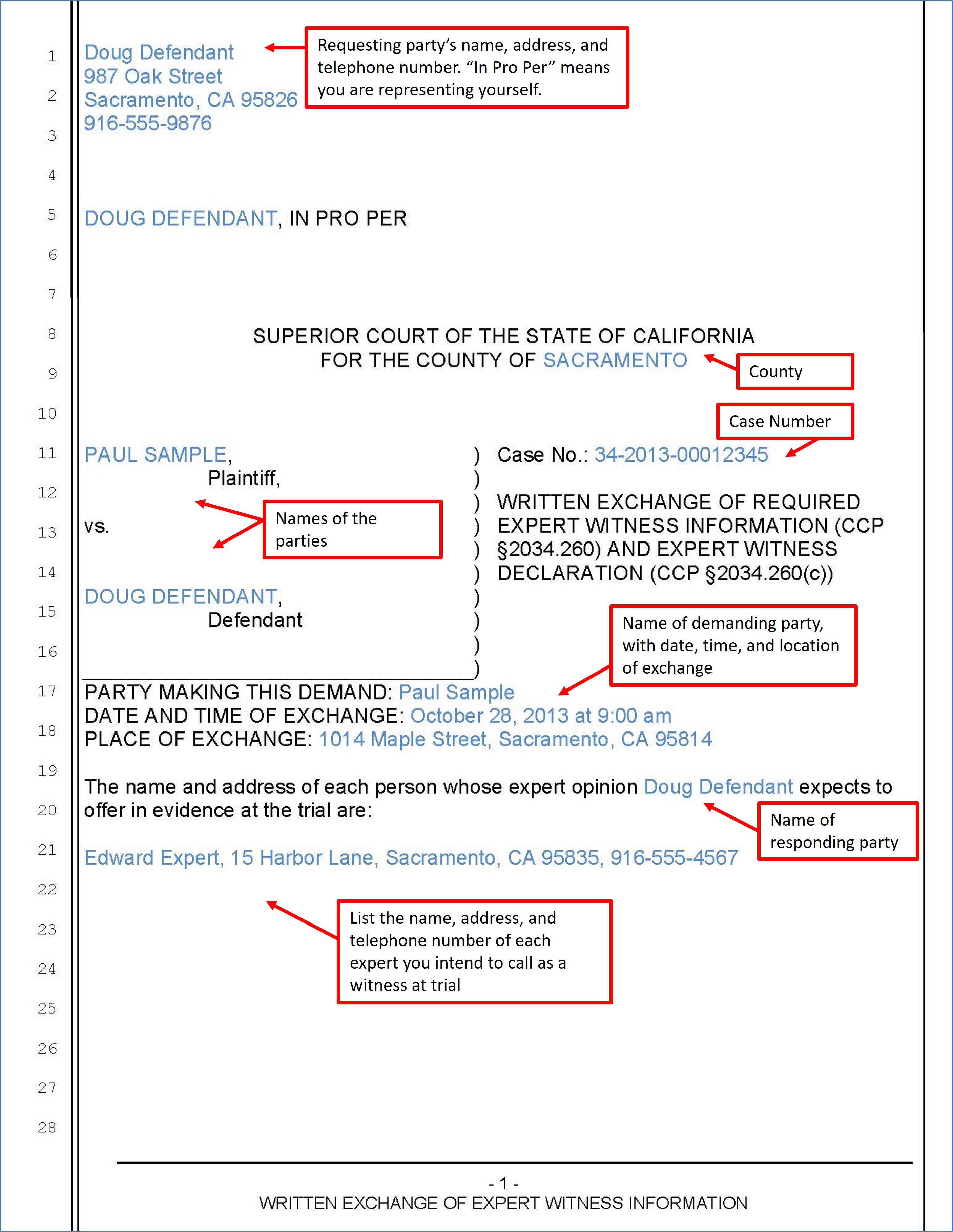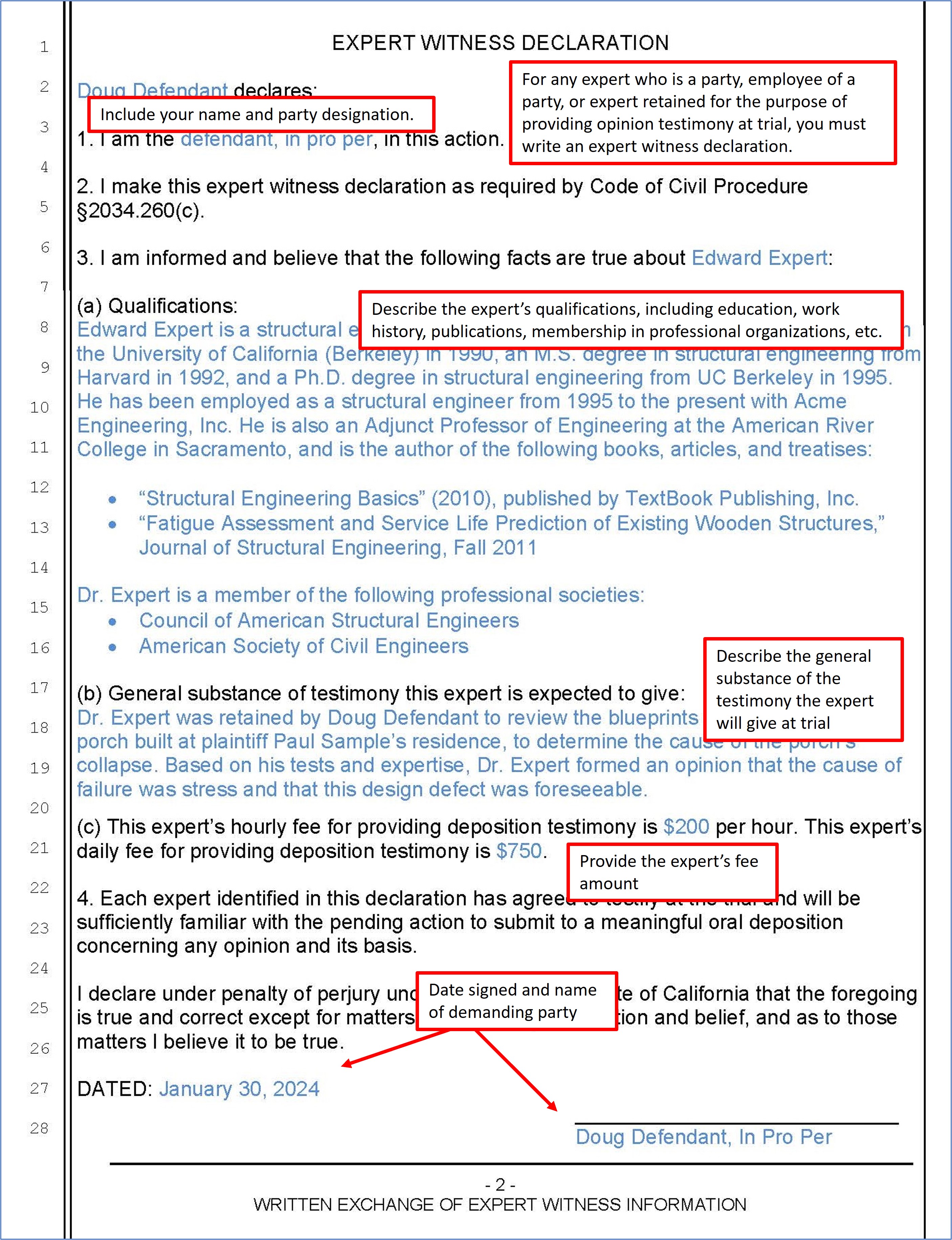Discovery: Exchange of Expert Witness Information
Templates and Forms
Background
After a trial date is set, any party may demand the simultaneous exchange of information about the expert witnesses all other parties intend to have testify at trial. California Code of Civil Procedure (CCP) § 2034.210(b) defines “experts” as parties, employees of a party, or witnesses who have been retained to express an opinion as part of the litigation. Parties may also demand the production of all discoverable reports and writings made in the course of preparing the expert’s opinion. See California Expert Witness Guide (KFC 1042 .K45) Chap. 10 (available electronically on the Law Library’s computers, using OnLaw), for more information on the types of writings that are discoverable.
Any party in the case may make a demand for exchange of expert witness information. Only one party in the case needs to make this demand. Once any party makes a demand, all parties must simultaneously disclose their expert witness information to all other parties in the case.
This exchange provides opposing parties with enough information and time to prepare for trial. Expert witnesses will generally have specialized knowledge of a scientific or technical field. By receiving information about the witness and their intended testimony ahead of time, opposing parties have the opportunity to research the expert, depose the expert, and gather information and evidence in the specialized field that may be useful during the cross-examination of the expert.
Step-by-Step Instructions
1
Prepare Your Demand
There is no Judicial Council form for this procedure. Instead, the relevant document must be typed on 28-line pleading paper. A customizable template may be downloaded from this link:
If you have already received a demand for exchange of expert witness information from another party, skip to Step 4.
A sample demand for exchange of expert witness information is available at the end of this Guide.
California law provides very strict timelines for the demand and exchange of expert witness information. You will need to determine two separate dates:
Date of demand. You must make your demand no later than the 10th day after the initial trial date is set, or 70 days before trial date, whichever is closer to the trial date. If that day falls on a Saturday, Sunday or court holiday, the last day to make your demand is the next court day closer to the trial date (CCP § 2034.220).
Date of exchange. Lists must be exchanged 50 days before the trial date, or 20 days after service of demand, whichever is closer to the trial date. If that day falls on a Saturday, Sunday or court holiday, the last day to provide your list is the next court day closer to the trial date (CCP § 2034.230(b)), unless the court orders an earlier or later exchange.
For more information, see California Civil Discovery Practice §§ 11.9-11.14 (KFC 1020 .C35), available electronically on the Law Library’s computers, using OnLaw.
2
Make Copies
Make one photocopy of your demand for each party in the case.
3
Have Your Demand Served
A photocopy of your demand must be served on each attorney or self-represented party in the case. Service may be completed by mail, by a person over the age of 18 who is not a party to the case. The person serving your requests must complete a proof of service form, typically a Proof of Service by First Class Mail (POS-030). For more information, see the Step-by-Step guide on Proof of Service by Mail on the Law Library’s website.
The demands, lists, and declarations are not filed with the court. Retain your original demand and proof of service until 6 months after final disposition of the case. If the contents of the demand, lists, or declarations become relevant to any pending matter before the court, they are lodged with the court at that time (CCP § 2034.290).
4
Exchange Expert Witness Information
Each party must disclose information about all experts whose testimony will be used at trial. Once a demand is made, all parties must simultaneously exchange the names and addresses of every person who will offer an expert opinion in the trial. This exchange may occur at a meeting of the attorneys and self-represented parties in the case, or by mail.
There is no Judicial Council form for this procedure. Instead, the relevant document must be typed on 28-line pleading paper. A customizable template may be downloaded from this link:
A sample written exchange of expert information is available at the end of this Guide.
If any of the experts is a party, employee of a party, or expert retained for the purpose of providing an expert opinion at trial, the exchange of information must also include an “expert witness declaration.” This declaration is a statement signed by the attorney or self-represented party that provides information about the expert’s qualifications and a brief description of the general substance of the expert’s anticipated testimony. The declaration also includes information about the expert’s fees, and assurances that the expert has agreed to testify and will be sufficiently familiar with the case to provide meaningful testimony. A sample expert witness declaration is available at the end of this Guide, and is included as the second page of the customizable template listed above.
Finally, if any party does not intend to offer the testimony of any expert witness, the party should state this fact.
If a party does not disclose their experts, include an expert declaration when required, produce reports and writings of experts demanded under CCP § 2034.270, or make their expert available for deposition, the court must exclude any evidence from that expert (CCP § 2034.300), except under a few narrow circumstances (CCP § 2034.310).
For More Information
California Civil Discovery KFC 1020 .H64 Chap. 10.
Electronic Access: On the Law Library’s computers, using Lexis Advance.
California Civil Discovery Practice KFC 1020 .C35 Chap. 11.
Electronic Access: On the Law Library’s computers, using OnLaw.
California Civil Litigation and Discovery KFC 995 .G674 Chap. 17
California Deposition and Discovery Practice KFC 1020 .D44 Chap. 64.
Electronic Access: On the Law Library’s computers, using Lexis Advance.
California Discovery Citations KFC 1020 .F56 Chap. 8.
California Expert Witness Guide KFC 1042 .K45 Chap. 10.
Electronic Access: On the Law Library’s computers, using OnLaw.
California Forms of Pleading and Practice KFC 1010 .A65 C3 (Ready Reference) Chap. 198.
Electronic Access: On the Law Library’s computers, using Lexis Advance.
California Practice Guide: Civil Procedure Before Trial KFC 995 .W45 Chap. 8J.
Matthew Bender Practice Guide: California Civil Discovery KFC 1020 .M37 Chap. 13.
Samples




This material is intended as general information only. Your case may have factors requiring different procedures or forms. The information and instructions are provided for use in the Sacramento County Superior Court. Please keep in mind that each court may have different requirements. If you need further assistance consult a lawyer.



